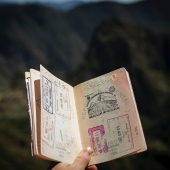Depending on if you are going to study French in Canada, a masters in Europe or spending a month in a summer camp, the investment required for your adventure may vary (a lot). Have you defined where and for how long will you study abroad? Follow our tips to make your budget last longer and manage to have some money left for souvenirs!
|
Before you start: in case you're taking a long duration program – an Undergraduate degree, for example - follow each step considering a monthly budget. If your course is going to last for a month or less, simply apply the following tips to your global expenditure. |
1. Understand where your money comes from and how much you're allowed to spend
Is it your family who is going to fund your studies abroad? Are you thinking of asking for a loan or applying for a scholarship? Are you planning to have a part-time job while studying?
A budget can vary wildly depending on the funding source. If you have more than one source, perhaps you can consider spending a little more on your adventure abroad.
2. Make a forecast of your expenses and organize them
How many times do you think you will you hang out with your colleagues? What kind of diet will you have? Can your diet include cheap options? How much money will you spend on household and daily expenses? How much money will you need to invest in school supplies?
After answering these questions, calculate the necessary amount you will need for each part of your adventure abroad - flights, school materials, accommodation, daily expenses (food, transportation, house bills) and leisure.
3. Estimate a budget and stick to it!
Be realistic and think about all the bills you have to pay: is the money you are planning to spend going to be enough? Will you manage to have some money left at the end?
Now that you know where the money comes from and how much you will have available to spend on each part of your study trip, sum up all the parts to find the total amount of money you will need for your study trip. Don’t forget about what you will also have to spend in your home country with documentation, clothing, bags and other things you may need to carry with you towards your country of destination.
4. Keep your savings untouched and avoid overdrafts
It is also important that you save some money for emergencies. Did you find your “realistic budget” already? Now add that "extra money" for an eventual last minute spending and define the situations when you´re allowed using it exactly… If you keep thinking that, since you have an emergency fund, you don´t have worry about overpassing your budget, then you will end up losing all your savings on your first days abroad!
5. Prioritize: what you need vs what you want
Where can you save? List and assort the things you will need to pay for during your study abroad program, never forgetting that leisure and fun are an essential part of your trip’s success. However, you only need to think for a little and separate, by order of importance, a series of activities you would like to try.
Once you arrive at your country of destination, you will realise that not everything you had listed is worthwhile and that you should consider some investments over less important others.
6. Follow closely your bank account status and be careful with the first week’s expenditures
First, try not to fall into money traps - some especially designed to trick new people in town and school freshmen – that will only bring you unnecessary expenses and crash the budget you planned with such dedication. Show them you are aware of these dangers and that you´re not a study abroad “newbie” ... well... at least in this finance section.
Nowadays, wherever you are, you can check your bank account status online for free, on your computer or through mobile apps. Access it when necessary and write down how much you have already spent and how much you still have available up to the end of the month.
|
You might know but it's always good to remember: right at the beginning of each month, pay or separate the money for all your essential monthly bills, so you can slowly and consciously spend the rest throughout the month. |










